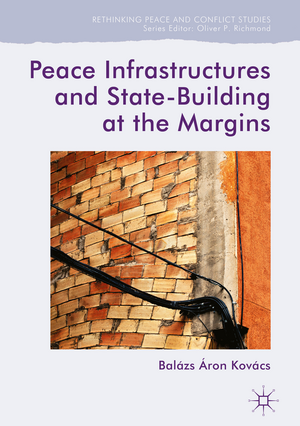Peace Infrastructures and State-Building at the Margins: Rethinking Peace and Conflict Studies
Autor Balázs Áron Kovácsen Limba Engleză Hardback – 7 aug 2018
This book offers a critical examination of ‘infrastructures for peace’, originally proposed as a framework of conflict transformation. Through an exploration of the statist ideological underpinnings of peace-building, it traces how the concept was transformed by institutional actors – international organisations and states – into a tool to further the state-building goals of liberal peace-building.
| Toate formatele și edițiile | Preț | Express |
|---|---|---|
| Paperback (1) | 526.18 lei 43-57 zile | |
| Springer International Publishing – 21 dec 2018 | 526.18 lei 43-57 zile | |
| Hardback (1) | 700.94 lei 43-57 zile | |
| Springer International Publishing – 7 aug 2018 | 700.94 lei 43-57 zile |
Din seria Rethinking Peace and Conflict Studies
-
 Preț: 357.93 lei
Preț: 357.93 lei -
 Preț: 113.00 lei
Preț: 113.00 lei - 15%
 Preț: 646.62 lei
Preț: 646.62 lei -
 Preț: 318.69 lei
Preț: 318.69 lei - 20%
 Preț: 565.31 lei
Preț: 565.31 lei -
 Preț: 272.92 lei
Preț: 272.92 lei -
 Preț: 387.20 lei
Preț: 387.20 lei - 15%
 Preț: 574.77 lei
Preț: 574.77 lei - 15%
 Preț: 699.45 lei
Preț: 699.45 lei -
 Preț: 390.63 lei
Preț: 390.63 lei - 15%
 Preț: 639.25 lei
Preț: 639.25 lei -
 Preț: 390.63 lei
Preț: 390.63 lei - 15%
 Preț: 644.30 lei
Preț: 644.30 lei -
 Preț: 390.63 lei
Preț: 390.63 lei - 15%
 Preț: 644.95 lei
Preț: 644.95 lei -
 Preț: 392.21 lei
Preț: 392.21 lei -
 Preț: 384.86 lei
Preț: 384.86 lei -
 Preț: 387.58 lei
Preț: 387.58 lei -
 Preț: 386.99 lei
Preț: 386.99 lei -
 Preț: 385.84 lei
Preț: 385.84 lei -
 Preț: 388.72 lei
Preț: 388.72 lei -
 Preț: 390.63 lei
Preț: 390.63 lei -
 Preț: 389.49 lei
Preț: 389.49 lei -
 Preț: 391.61 lei
Preț: 391.61 lei -
 Preț: 390.63 lei
Preț: 390.63 lei -
 Preț: 391.61 lei
Preț: 391.61 lei -
 Preț: 389.88 lei
Preț: 389.88 lei -
 Preț: 386.39 lei
Preț: 386.39 lei -
 Preț: 426.56 lei
Preț: 426.56 lei -
 Preț: 389.88 lei
Preț: 389.88 lei -
 Preț: 389.88 lei
Preț: 389.88 lei -
 Preț: 417.14 lei
Preț: 417.14 lei - 15%
 Preț: 699.93 lei
Preț: 699.93 lei -
 Preț: 392.60 lei
Preț: 392.60 lei -
 Preț: 389.11 lei
Preț: 389.11 lei - 18%
 Preț: 783.25 lei
Preț: 783.25 lei -
 Preț: 392.60 lei
Preț: 392.60 lei -
 Preț: 388.72 lei
Preț: 388.72 lei -
 Preț: 388.72 lei
Preț: 388.72 lei -
 Preț: 388.52 lei
Preț: 388.52 lei
Preț: 700.94 lei
Preț vechi: 824.63 lei
-15% Nou
Puncte Express: 1051
Preț estimativ în valută:
134.12€ • 140.41$ • 110.98£
134.12€ • 140.41$ • 110.98£
Carte tipărită la comandă
Livrare economică 07-21 aprilie
Preluare comenzi: 021 569.72.76
Specificații
ISBN-13: 9783319895659
ISBN-10: 3319895656
Pagini: 361
Ilustrații: XIV, 303 p. 17 illus.
Dimensiuni: 148 x 210 mm
Greutate: 0.53 kg
Ediția:1st ed. 2019
Editura: Springer International Publishing
Colecția Palgrave Macmillan
Seria Rethinking Peace and Conflict Studies
Locul publicării:Cham, Switzerland
ISBN-10: 3319895656
Pagini: 361
Ilustrații: XIV, 303 p. 17 illus.
Dimensiuni: 148 x 210 mm
Greutate: 0.53 kg
Ediția:1st ed. 2019
Editura: Springer International Publishing
Colecția Palgrave Macmillan
Seria Rethinking Peace and Conflict Studies
Locul publicării:Cham, Switzerland
Cuprins
Chapter 1 – Preface.- Part I – Peacebuilding-as-statebuilding – A Landscape.- Chapter 2 – Peace-building.- Chapter 3 – State-building.- Chapter 4 – State Formation, the Local and Hybridity.- Chapter 5 – Peace Infrastructures.- Part II – Peaceful and Prosperous Communities.- Chapter 6 – Manila: Designing Peaceful and Prosperous Communities – The PAMANA Framework.- Chapter 7 – Sorsogon: Field Research Findings.- Chapter 8 – Back in Manila: PAMANA – Peace-building, State-building and the Contested State.- Chapter 9 – Whither Peace Infrastructures?.
Notă biografică
Balázs Áron Kovács is the manager of the Philippines programme of forumZFD, a German NGO working on conflict transformation. He is based in Davao City, Mindanao, Philippines. Dr Kovacs’s research in the field of critical peace and conflict studies focuses on state-society interactions in the context of peace and state-building.
Textul de pe ultima copertă
This book offers a critical examination of ‘infrastructures for peace’, originally proposed as a framework of conflict transformation. Through an exploration of the statist ideological underpinnings of peace-building, it traces how the concept was transformed by institutional actors – international organisations and states – into a tool to further the state-building goals of liberal peace-building.
Caracteristici
The first critical appraisal of this scope of the concept of peace infrastructures since it entered mainstream peace-building through its adoption by UNDP Argues that the model of peace infrastructure which has come to dominate the discourse and practice is deeply statist, and sees peace infrastructures as a more efficient means to liberal peace-building Adds to the already significant post-liberal peace discourse a more pointed discussion on statism, and approaches its subject not from a post-structuralist but from neo-Weberian and sociocultural evolutionary angle
